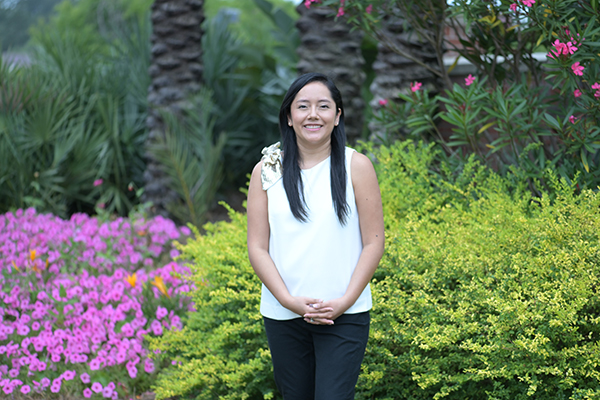Natali Ramirez-Bullon

"To find solutions to environmental problems"
College: Arts and Sciences
Degree Program: Ecology and Evolution
Degree: Doctorate
Awards: AAUW American Dissertation Fellowship (2021); Katherine S. McCarter Graduate Student Policy Award (2020); National Socio-Environmental Synthesis Center Graduate Pursuits Award (2018); Garden Club of America Catherine H. Beattie Fellowship in Conservation Horticulture (2014)
Why FSU?
I was looking into different programs in ecology and evolution for a graduate degree, and my employment supervisor at the time met my advisor, Dr. Alice Winn, at a rare plant conservation meeting. My supervisor was impressed with Dr. Winn’s insights and her rapport with her graduate students, so I researched the Ecology and Evolution (E&E) Program at FSU. The E&E program at FSU was a good fit for me because of the collaborative nature of the program and the opportunity to work with Dr. Winn.
Motivation to pursue a graduate degree
My interest in becoming a plant ecologist stems from a childhood fascination with the dramatic changes in plant diversity I saw when traveling from the Peruvian coast to the Peruvian Andes, where I lived in a mining camp due to my father’s job as a mining engineer. My first glimpse of uncontrolled extractive mining activities and their effect on native plant communities made me realize that my mission in life was to educate decision-makers and the public on how to manage these natural communities, and that has motivated me to pursue my PhD. I decided to pursue graduate education to become an expert in population ecology so I could help quantify plant conservation goals and objectives.
Importance and impact of research
Understanding what makes a rare species persist and not go extinct is crucial in the face of rapid biodiversity loss and environmental change. Ecological research benefits us in multiple ways, from understanding the function of healthy ecosystems that provides us with food to pest regulation, pollination, and climate regulation. My research is important because it helps identify which species need prioritization by distinguishing species in danger of imminent extinction from those that can persist without intervention.
Advice for prospective graduate students
Look carefully at the programs available for your discipline and decide which one aligns best with your professional goals. Within that program, choose a faculty mentor (advisor) and make a connection with him/her before you apply. Make your email personal and incorporate part of what you know or find interesting about their research. Do not get discouraged if they don’t reply; try again.
Accomplishments during graduate career
I am very honored to have received the AAUW American Dissertation Fellowship, which supports me with a stipend for the last year of my PhD. I am also very fortunate to have initiated a National Science Foundation-funded graduate pursuit at the National Socio-Environmental Synthesis Center (SESYNC) that allowed me to collaborate with an interdisciplinary group of scientists. We are investigating how public engagement with biodiversity influences conservation policy and how it relates to conservation success. I am also a 2020 recipient of the Katherine S. McCarter Graduate Student Policy Award from the Ecological Society of America.
Career aspirations
My professional goal is to use science to negotiate better biodiversity conservation. I thrive on leading interdisciplinary teams to protect biodiversity and promote the sustainable development of communities.
